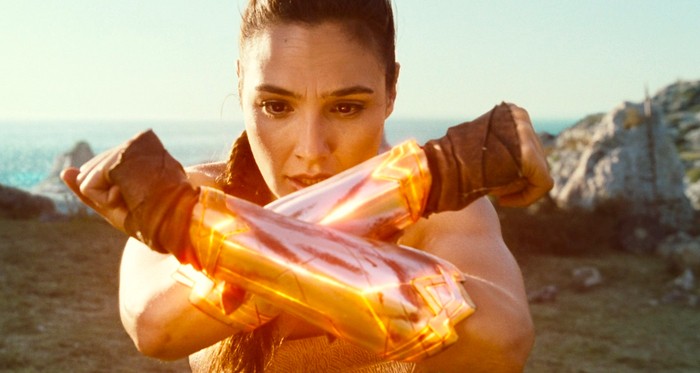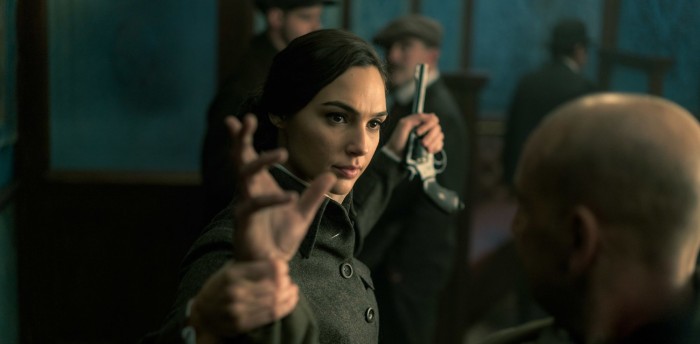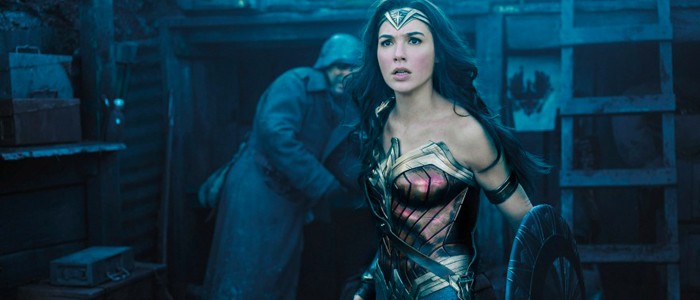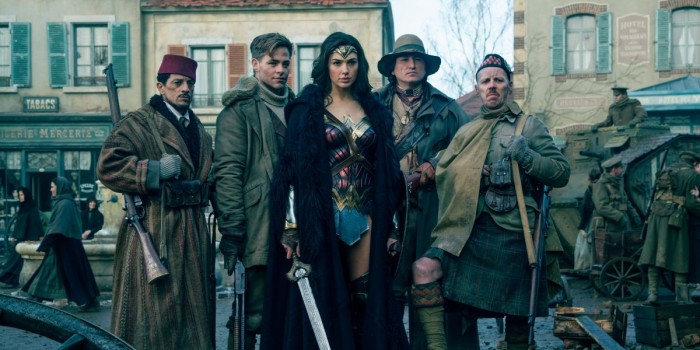'Wonder Woman' Is More Like A Disney Princess Story Than A Superhero Movie – And That's A Good Thing
(In our Spoiler Reviews, we take a deep dive into a new release and get to the heart of what makes it tick...and every story point is up for discussion. In this entry: Patty Jenkins' Wonder Woman.)
It's astounding that in this day and age, when superheroes are either disillusioned or self-deprecating, that we can have a hero like Wonder Woman. In the bleak DC Cinematic Universe, where nihilism reigns supreme, here we have a hero who champions the ideas of hope, compassion, and goodness.
Diana (Gal Gadot) is not dissimilar from the Disney princesses, who have long been heroes of overwhelming empathy. They are aspirational figures who exist in an elevated reality — fairy tales themselves are metaphorical by nature, and rarely depict anything other than a black and white reality. This is Diana at the beginning of the film, the embodiment of the ultimate Disney princess, for all the gifts and faults that they have — though thankfully without the frequently troublesome depiction of an "evil" mother or stepmother figure commonly seen in fairy tales.
Diana has the inquisitiveness of Ariel, longing to escape the narrow confines of her world. She is as fiercely honorable as Mulan and Moana, believing it her duty to put the world's conflicts over her own well-being. She has wisdom of Pocahontas, whose knowledge and principles in certain areas far outstrip her ordinary counterpart, Steve Trevor. And, of course, she has the magical hair of Rapunzel in Tangled (not literally, but you get what I'm saying). Her story is almost an exact parallel to Tangled too — arguably more so than even the Captain America: First Avenger or Thor comparisons that everyone has made.
The premise of Patty Jenkins' Wonder Woman, however, seems posed to strip all those ideas away. It may seem odd to say she lives in a fairy tale world — Themyscira with its battle-ready Amazon warriors looks at first to be the polar opposite of that — but she does indeed hail from a paradise where there is no moral gray area. Diana of Themyscira is a hero who only operates in absolutes, in which there are only people who are inherently good or evil. But Wonder Woman takes place during World War I, which was a war that operated in shades of grey, in which there was no absolute villain. Through Diana's experiences at the war-torn Belgian front of World War I, Wonder Woman questions and deconstructs the high, aspirational ideals that both Diana, and the Disney princesses she reflects, champion.
Wonder Woman tests Diana's faith in humanity and idealism until she is shaken, unable to reconcile her absolutist principles with the morally gray world that she inhabits. But instead of teaching Diana to conform with reality, Wonder Woman only reaffirms her faith.
To bring another Disney movie into it: It's Enchanted writ gritty.
Part of Your War
For much of Wonder Woman comics' history, the secluded Amazonian island of Themyscira was unnamed, known only as Paradise Island. Themyscira was only named in 1987, after the mythological Greek city from which the warrior women tribe of the Amazons hails. In the Wonder Woman comics, the island is an allegory for the security of the home, where women could create their own world apart from the male-dominated workplace. Here, Themyscira acts as the starting point of a fairy tale: Diana's own gilded, sheltered tower.
The only child on the island, Diana is beloved by all, especially her near-stifling mother Hippolyta (Connie Nielsen). But true to form for any modern Disney princess, Diana is a rabble-rouser, dissatisfied with her station in life and wanting more than anything to become a warrior like her powerful aunt Antiope (Robin Wright). Don't believe in the parallels? Just look at the beginning of The Little Mermaid, Mulan, Pocahontas, and most of all, Tangled. Each of the heroes in these movies want for something more — there's a reason that Disney has perfected the "I Want" song, in which the heroine expresses the object of her longing: adventure, meaning, freedom.
For Diana, it's all of these things. There's even a moment in Wonder Woman that is the perfect moment for Diana's "I Want" song, when a grown Diana, confused by the sudden flare of power from her bracelets, runs from the wary stares of her fellow Amazonians to a cliff overlooking the sea, gazing out and wondering at her place in this world. It's a quiet moment, but it speaks volumes — it would have spoken more volumes, of course, if it had been done in song, but who am I to judge?
The Disney parallels are certainly the most obvious in Themyscira. A young Diana is regaled with stories of old battles with the God of War, Ares, in a plot-relevant bedtime story (Tangled); an adult Diana sees Steve Trevor's (Chris Pine) plane crash into the ocean and rescues him (The Little Mermaid); and a stubborn, noble Diana steals her mother's sword and armor to wade into war (Mulan).
What separates Diana from her Disney compatriots is that she is not as isolated as them. Disney heroines always found themselves separated from family and forced to rely on their internal strengths — an extension of fairy tales roots as cautionary tales for women if they separate from their communities. Diana, however, does not have to wage war in stolen armor. As she and Steve prepare to set sail for London, Hippolyta and her guard gallop onto the beach. Sorrowful, Hippolyta sends Diana off with a blessing and a warning: "Be careful in the world of men, Diana. They do not deserve you."
A Whole New World
Let's talk about Steve Trevor: Wonder Woman's answer and fix to the superhero love interest problem. But is it a revelatory performance by Pine with innovative writing that recalls Lois Lane in the Christopher Reeve Superman? Or is he based on a template of believable male love interests in Disney movies who act as incredible support systems for the heroines? Don't look to the unnamed Prince Charming in early Disney movies, but at Prince Eric, John Smith, and Flynn Rider. Flynn from Tangled especially was created as an equal to Rapunzel, and you can see shades of him in Steve Trevor: as the world-weary companion who acts as the heroine's unwitting guide outside of her sheltered world.
Steve is the second hero of Wonder Woman, not just in his valiant actions or debonair Allied spy gig, but in his story. More so than even the epitome of superhero love interests, Lois Lane, he is an equal to Diana narratively — which is quite a feat in an origin movie that already has to set up and do so much. I'm going to bring up again Flynn Rider, who we're introduced to as the protagonist in Tangled until the perspective shifts to Rapunzel. As much as this shift away from the Disney princess of the movie reeks of gender-based marketing (Disney at the time was trying to appeal more to boys), it worked. And because it worked, Tangled — in my opinion — provided the basis for the electric, charming scenes we were blessed with between Diana and Steve. Other than the wonderfully frank banter about marriage and sex on the sailboat, the fashion show in which Steve is agape at Diana's beauty is a standout.
Their equal standing allows for the movie to organically create funny moments out of Diana's fish-out-of-water reactions to London and Steve's exasperation at her behavior without putting either of them down for the sake of the joke. We laugh when Diana casually strolls into a men-only meeting of the Imperial War Cabinet led by Sir Patrick Morgan (David Thewlis), and Steve tries to push her out, but it's character-driven comedy: Diana is both ahead and behind the times with her presumption that women have equal footing, and Steve is just trying to get her to blend in.
Steve, like Diana, is flawed. As a foil to her uncompromising nature, he is all compromise, worn down by the horrors he has seen in the long war. Though Diana was unperturbed by his actions at the war cabinet, she is horrified when he gives into his superiors' commands that he do nothing about the information of the new mustard gas masterminded by General Erich Ludendorff (Danny Huston) Doctor Isabel Maru (Elena Anaya) — two hammy Disney villains hiding in a DC superhero movie, even accompanied with their own melodramatic entrance scores. Steve's superiors warn him against disturbing the negotiations of an armistice with Germany, and he concedes.
Before Diana can get the chance to berate him longer, Steve reveals that he plans to stop the mustard gas' release anyways — the first sign of Diana's persistent influence on him. In turn, she eases up on her black-and-white view of the world thanks to Steve — uneasily accepting Steve's less-than-honorable recruits for the mission: the spy Sameer (Saïd Taghmaoui), the sharpshooter Charlie (Ewen Bremner), and the smuggler Chief (Eugene Brave Rock). To their surprise, they are aided by Sir Patrick and Steve's assistant, Etta Candy (Lucy Punch), and they set off for the Western Front in Belgium.
"A liar, a thief, and a smuggler," Diana nearly sneers at her new companions, to which Steve points out that he is all of those things. Though Diana is uncompromising yet, this becomes a turning point for both Diana and Steve as they find themselves changed and bettered by each other.
At Last I See the Light
"We're all fighting our own battles," Sameer tells Diana after the group had crossed No Man's Land and freed the tiny Belgian village of Veld. "Just like you're fighting yours."
Until then, Diana had assumed they were all fighting the same war, but she slowly learned that humans were more complicated than she could have guessed. Diana's incredible No Man's Land fight — of which so many good things have already been written about — is not only a prime example of Diana's own battle, but of the conflicting ideas she is starting to process about mankind.
As the group makes their way through the debris and explosions of the Belgian trenches, Diana is horrified to see innocent women and children in pain — and no one doing a thing about it. When she hears of a village enslaved by the Germans, she rushes to save them, but Steve stops her, claiming that no one can cross No Man's Land, and that "it's not what we're here to do."
"You're right," she says, shedding her civilian clothing to reveal her Wonder Woman armor underneath. "But it's what I am going to do."
Resplendent in her armored glory, deflecting bullets — in a wonderful piece of metatextual imagery of the criticisms against Wonder Woman as well as the Warner Bros. executives' baffling response to the scene itself — Diana barrels through No Man's Land, destroying the machine guns aimed at the Allied trenches and making her way to the enslaved village as Steve and co., follow. With the help of Steve, Sameer, Charlie, and Chief, she successfully takes out the occupying German soldiers and frees the villagers. It's the most triumphant action scene of movie — yes, more so than the awe-inspiring fight in which the Amazons taking down German soldiers on the beaches of Themyscira — because, as director Patty Jenkins puts it, "This is a scene about her becoming Wonder Woman."
It is when Diana is fighting for, and witnessing the complexity of, the little people that she comes into her own. And this is when she transcends the Disney princess genre which she had originally inhabited.
A Disney fairy tale must always have a villain: it is part of the nature of a story that operates in black and white, good and evil. The Disney heroines never have to wrestle with the nature of humanity because, by default, they are already dealing with the best and worst of humanity. What Wonder Woman does in the first half of its movie is revolutionary because, despite Diana's beliefs, there is no real villain. Ludendorff and Maru are devious to be sure, but they are clearly not the Big Bad. Because Diana's battle is not with something she can punch, but with the idea that there is an intrinsic darkness inside mankind.
A Tale as Old as Time
The beginning of the third act of Wonder Woman promises to deliver one of the most interesting messages from a superhero movie, as Diana realizes that people aren't as good as she expected. Foiled by Steve in her attempt to kill Ludendorff — who she had come to believe was Ares — at the gala, and distraught after the Germans slaughter the village of Veld with mustard gas, she lashes out at him.
"Ares didn't just corrupt the Germans, he corrupted you! He corrupted everyone!" she accused.
Stubborn in her conviction that man is inherently good and that killing Ares would solve everything, Diana chooses the Disney fairy tale path over the hints of the reality that she had witnessed up until then. She follows Ludendorff to the flight hangar where the Germans are loading up the mustard gas bombs, and kills him. But as she proudly scans the hangar after her battle, there's a beat. Nothing had changed. The war was still on, and killing Ares had no effect on a war instigated by the humans themselves — now that would have been an incredibly powerful reveal. And it would have allowed for Diana to make the same decision that she ultimately comes to after punching the real Ares around for a bit.
The reveal that Sir Patrick is Ares is not a misstep. Nor was the reveal that Diana was destined to defeat him. It was the whispers that Ares spoke into Luddendorf's, Maru's, and countless other ears — the implication that he had any omniscient influence on the war at all. Perhaps if he had been an ineffectual god, a supreme being who could only "corrupt" people as an ordinary man, Wonder Woman would have been more impactful, and its deconstruction of the Disney princess tale even more successful. Because by removing the Ultimate Evil altogether and revealing to Diana that mankind is flawed, her final decision to protect them all the same is made all the more powerful.
"Maybe it's not about what we deserve. Maybe it's about believing," Steve pleads with Diana before she fights Ares and he leaves to stop the mustard gas bombs. It's amazing — Wonder Woman both denies and reaffirms the hope and, yes, belief that are at the core of Disney fairy tales, and which make up Diana's essence. She was told she was wrong, her belief was shaken, nevertheless, she persisted. While humankind may not be inherently good as she presumed, neither were they inherently evil. It's exemplified in the ordinary people she saved and lost, and in Steve, who represented both the best and worst of humankind to Diana, and whose sacrifice pushed her to that realization.
Bookended by narration from present-day Diana as she reflects on her first adventure out in the world, Wonder Woman could easily have been a cautionary tale — and it initially seemed like one, with Diana wearily opining in the very first scene, "I used to want to save the world." But happily, it was not.
True love, after all, was what won the day.




